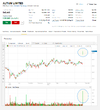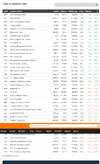Dona Ferentes
BHINNEKATUNGGAL IKA
- Joined
- 11 January 2016
- Posts
- 17,291
- Reactions
- 23,623
how good to see real companies, billion dollar caps, not the rats and mice, 1c and 5-10M cap types, putting on good runs ... Breville nearly up 15 per cent on Monday, though Iress was dumped
come Tuesday, and a couple of standouts
.
"Run hard on results day and history says a stock is likely to keep running, particularly in a market where fund managers are a bit uncertain of the macroeconomic environment and are holding on to winners longer than usual. Fund managers if you get reporting season right – if the stocks you hold beat expectations and trade well – their job is pretty much done for the next six months.
"And it is amazing how quickly investors are to summarise a result and get trading. Within 30 minutes or an hour of a 100-page plus annual report being released to the market, and before management has answered questions on the results call, trading desks will have labelled the result a beat, miss or inline.
"Investors are flooded with these trading desk calls – and they all tend to be pretty similar. Trading desks, particularly hungry this year after a six-month malaise in activity, bombard clients with emails that summarise the results and usually have links to the all-important company calls and sell-side arranged briefings.
"These emails and first impression notes shape portfolio managers’ thoughts, particularly on a day like Tuesday when an investor’s attention may be split across a dozen companies. These portfolio managers will mostly get one-on-one meetings with company management in the following 10 days, but most of the share price damage is done on results day.
"So, first impressions are critical. The brokers’ beat/miss/in-line calls do move the market. Tuesday was a prime example: the Altium, Megaport and Hub24 raced out of the gate and held their gains all day, while Data#3, Perenti, AGL and Kogan.com slumped on opening and never stood a chance.
"Reporting season has really stepped up this week as far as share price reactions to results are concerned. The big movements coincide with a growing number of ex-50 and small-cap companies releasing their results, and should become more prevalent as small caps dominate the final phase of earnings next week.
"These companies are typically less closely followed by sell-side analysts and investors, and are therefore more prone to strong beats or misses on results day. They also tend to report later in the earnings season
come Tuesday, and a couple of standouts
.
"Run hard on results day and history says a stock is likely to keep running, particularly in a market where fund managers are a bit uncertain of the macroeconomic environment and are holding on to winners longer than usual. Fund managers if you get reporting season right – if the stocks you hold beat expectations and trade well – their job is pretty much done for the next six months.
"And it is amazing how quickly investors are to summarise a result and get trading. Within 30 minutes or an hour of a 100-page plus annual report being released to the market, and before management has answered questions on the results call, trading desks will have labelled the result a beat, miss or inline.
First impressions count
"The calls are based on how the numbers and outlook stack up against market expectations and are made well ahead of the management team fronting up to address questions on the traditional one-hour or 90-minute results presentation."Investors are flooded with these trading desk calls – and they all tend to be pretty similar. Trading desks, particularly hungry this year after a six-month malaise in activity, bombard clients with emails that summarise the results and usually have links to the all-important company calls and sell-side arranged briefings.
"These emails and first impression notes shape portfolio managers’ thoughts, particularly on a day like Tuesday when an investor’s attention may be split across a dozen companies. These portfolio managers will mostly get one-on-one meetings with company management in the following 10 days, but most of the share price damage is done on results day.
"So, first impressions are critical. The brokers’ beat/miss/in-line calls do move the market. Tuesday was a prime example: the Altium, Megaport and Hub24 raced out of the gate and held their gains all day, while Data#3, Perenti, AGL and Kogan.com slumped on opening and never stood a chance.
"Reporting season has really stepped up this week as far as share price reactions to results are concerned. The big movements coincide with a growing number of ex-50 and small-cap companies releasing their results, and should become more prevalent as small caps dominate the final phase of earnings next week.
"These companies are typically less closely followed by sell-side analysts and investors, and are therefore more prone to strong beats or misses on results day. They also tend to report later in the earnings season















